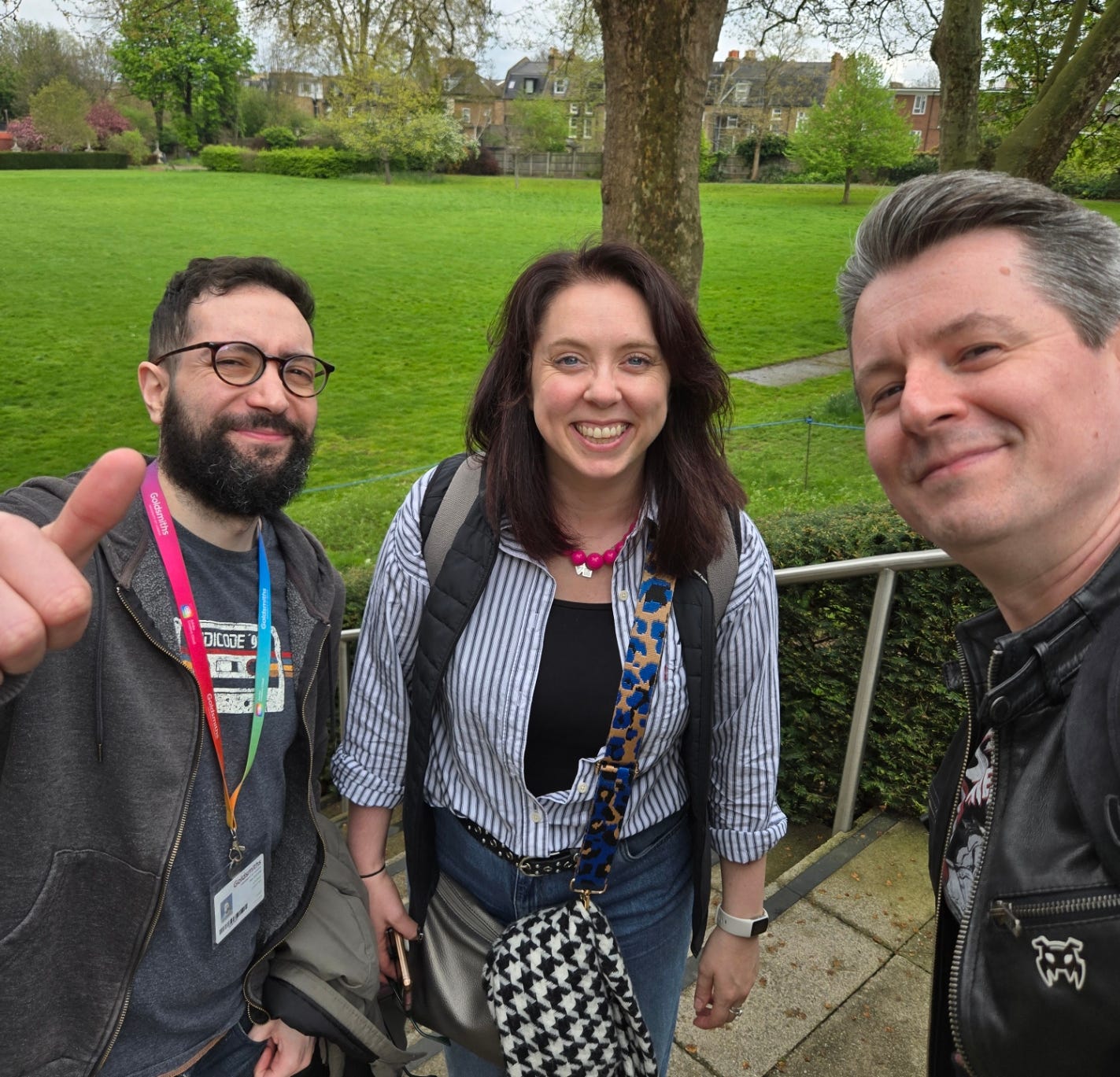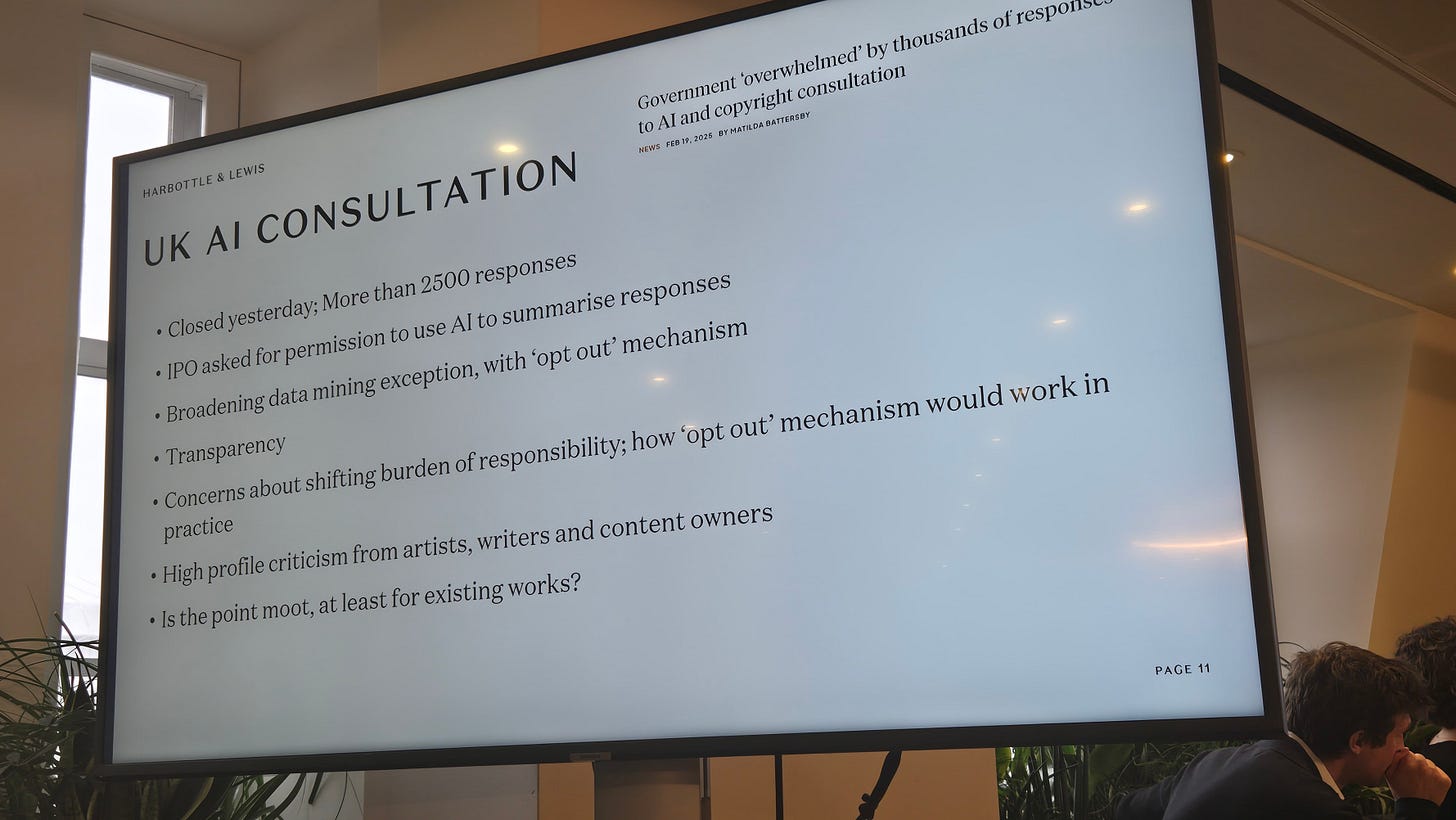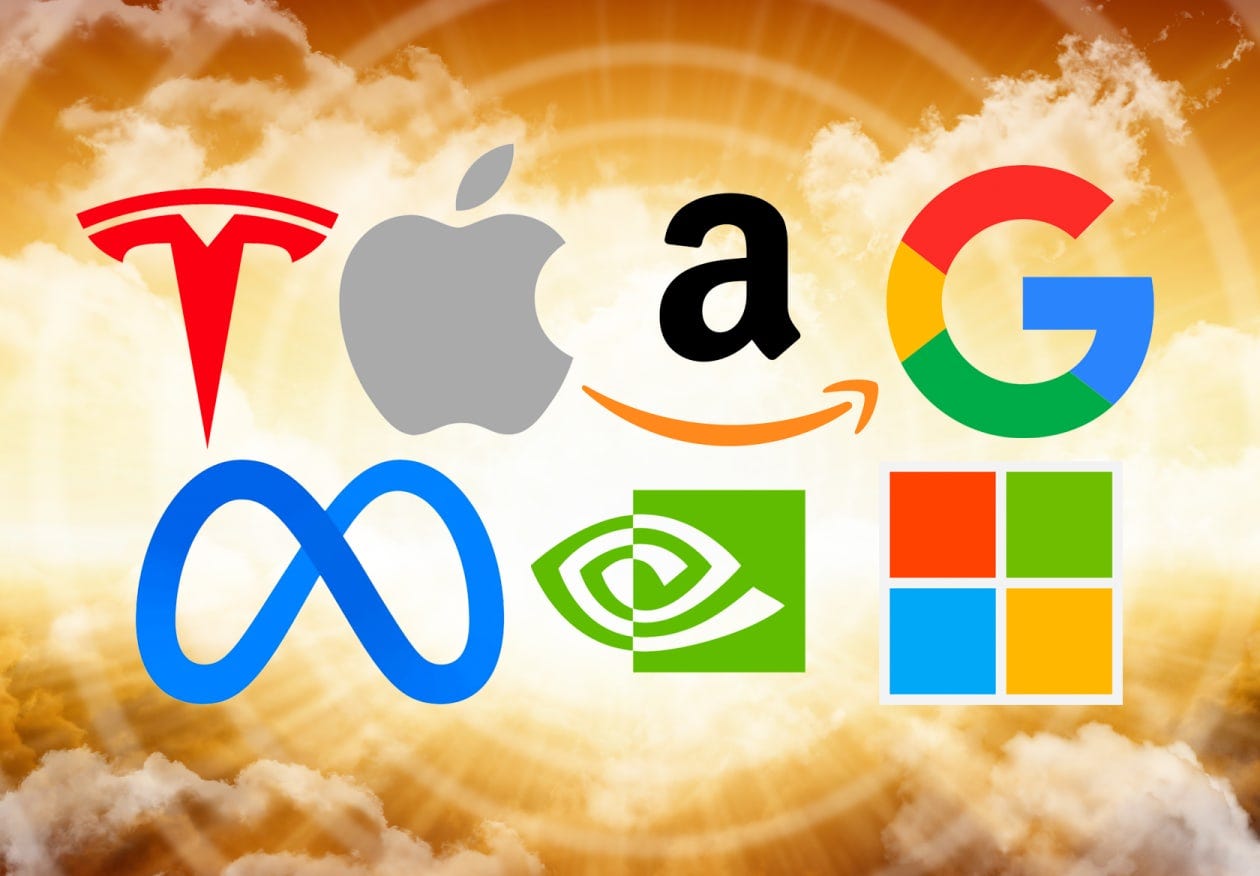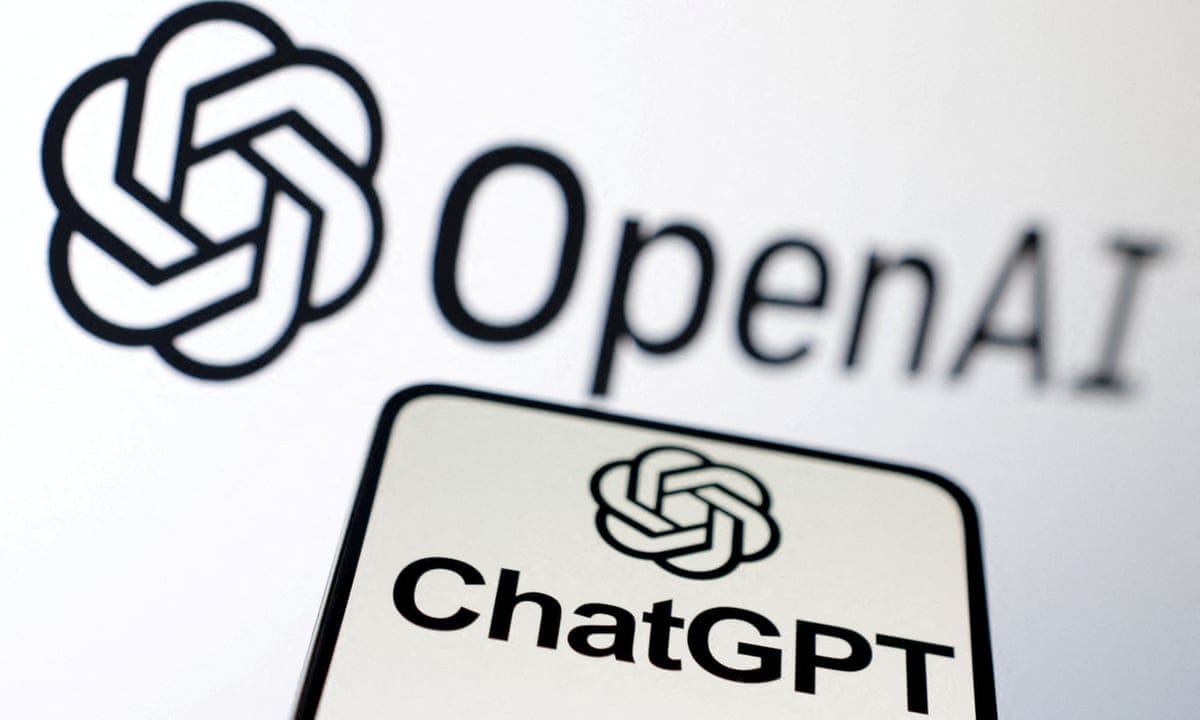The UK's AI Copyright Drama Continues | AI and Games Newsletter 16/04/25
Nobody's happy it seems...
The AI and Games Newsletter brings concise and informative discussion on artificial intelligence for video games each and every week. Plus summarising all of our content released across various channels, like our YouTube videos and in-person events like the AI and Games Conference.
You can subscribe to and support AI and Games on Substack, with weekly editions appearing in your inbox. The newsletter is also shared with our audience on LinkedIn. If you’d like to sponsor this newsletter, and get your name in front of our audience of over 6000 readers, please visit our sponsorship enquiries page.
Hello all, welcome to this weeks edition of the
newsletter. After discussing it briefly last week, we’re coming back to the conversation regarding AI and copyright law in the UK. As you may recall back in January I did a deep dive into the copyright consultation launched by the UK government, and what the implications of this were for the games industry. A few critical updates have happened since then, and it’s worth us revisiting the topic and discussing what has transpired.Can I take a moment to say I had a lot of positive feedback on that copyright issue in January, which was very encouraging. Particularly given I was really getting into the weeds of legal issues that are not my forte - after all, I’m an AI expert, not a lawyer. So this is all on you!
Outside of this, it’s been a rather quiet week, with little happening in the news that I wanted to focus on, but we’ll get into the announcements first! So strap in and let’s get started!
Follow AI and Games on: BlueSky | YouTube | LinkedIn | TikTok
Announcements
It’s a quiet week across all things
, but here’s a few things that should excite you!Coming Soon: AI and Games #79 - Trepang2
The next episode of our YouTube series is one I’ve very excited about. Last year I got to sit down with Wilson Chung and Jacob Andersson, two of the team of four developers behind the popular first-person shooter Trepang2, resulting in one of the biggest deep-dives we’ve had from a studio on the workings of their game.
Here’s a little teaser of what to expect in the coming weeks! As always episodes go live in early-access for our paying subscribers on the AI and Games Discord server. So join up to catch it before it goes live.
Conference Scheming
Fresh from our Discord server yesterday, enjoy a photo of myself, Alan Zucconi and Sally Kevan as we spent yesterday visiting what will hopefully be the confirmed site for the 2025 AI and Games Conference. More news on this as it happens!
The UK Copyright Drama Continues
Alrighty, time for our big story of the week. As discussed back in January, the UK government had launched a copyright consultation back in December in an effort to get feedback regards their ambitions for changes to copyright law. While I encourage you to go away and read the original issue from January - given we get into the much larger political ambitions of the government’s proposals, and the implications it could have on the games industry - the long and short of it is as follows…
The UK government wants to change the law such that clauses are provided that allows for AI companies to scrape UK copyright-protected materials wholesale for their own purposes. While it is largely argued as for following an existing EU proposal for non-commercial applications, the rules certainly don’t suggest this the reality going forward. However, in order to allow for businessses to protect their copyrighted materials, they would seek to implement an opt-out policy, where a business can say they do not want their assets being scraped.
Now if you’re reading this thinking this is a bad move, congratulations! You are aligned with the vast majority of people who have spoken up on the topic - myself included! Since the announcement we’ve seen everyone from authors to television producers and musicians speak up on the subject. The Make It Fair campaign launched on the closing date of the consultation as the vast majority of the creative industries spoke united in their disapproval of the government’s proposals.
So where are we now? While the government has achieved nothing of substance yet, the conversation continues to evolve, and it seems that Keir Starmer and his government’s policies have successfully annoyed everyone on both sides of the debate.
The Consultation Receives Record Numbers of Responses
Once the consultation wrapped up in late February, it was the job of the UK Intellectual Property Office (IPO) to consolidate the feedback received from the responses to the consultation. I had in fact attended an event at the offices of Harbottle & Lewis on February 26th, the day after the closing date of the consultation, and already it was estimated that there had been 2500 responses. Now let me stress that this is a lot for a government consultation on a policy directive - many of them are lucky to even break 100 responses from dedicated specialists in the field. This was already considered a significant number of submissions.
Meanwhile a news story out of ‘The Bookseller’ indicated that the IPO may have received around 13,000 responses. This is a rather unprecedented level of response to an IPO consultation, and I suspect it will take them much longer than usual to draft the response.
Still No Comment of Substance from the Games Industry
As mentioned a few weeks back when the Make it Fair campaign launched, it is comprised of businesses and representatives from across the creative industries. Ranging from musicians, to television producers, screen writers, newspaper editors, book publishers and more. But even now, after nearly two months, there’s still no representation from the video games industry - arguably the one area that competes with film as the heaviest adopter of the technology.
I continue to hear discussions on the subject, and I know that almost everyone I speak to in the sector - ranging from developers to studio heads to trade representatives - are not happy about this collective silence. Arguably the loudest voices are coming from the indie communities, with the ‘No Gen AI’ seal of approval becoming an easy way for developers to rally around their collective (justified) displeasure at generative AI’s encroachment into the industry. But the silence from the higher ups, is equally as understandable as it is concerning.
The AAA games industry is an a bit of a bind given that many of the larger studios, their publishers, and even the very platforms they seek to publish on, are controlled by technology firms who are heavily invested in the development and growth of AI technologies. In fact if you look at what are known as the “magnificent seven”, the collection of US-based tech businesses that have largely propped up the stock markets as they repeatedly exceed expectations, you’ll spot a trend. Let’s take a look:
Alphabet (i.e. Google):
Have invested in AI technologies significantly and have done for decades across a variety of their products (e.g. Google Maps, Gmail, Google search).
More recently their AI adoption has been pervasive courtesy of the Gemini large language models and the introduction of AI summaries on Google.
Provide a number of cloud-based services for games, including server hosting, data analytics and a broader range of support infrastructure for online (notably mobile games).
Owner of the Android mobile platform and the Google Play store.
Amazon:
Deploy AI as part of their main e-commerce platform.
Significant investment in AI via their AWS platforms, providing accessible tools for developers across different business sectors.
Run their own games studios and collaborate with external partners.
Own streaming platform Twitch.
Apple:
Have been implementing AI into their products since Siri back in 2011, and now have been deploying ‘Apple Intelligence’ across their provision.
Own the Mac and iOS platforms Ii.e. iPhone and iPad) which cater to games players in various ways (notably Apple Arcade).
Meta Platforms:
Been a prominent player in AI development for many years, and use it across their various social media networks (Facebook, Instagram, Threads).
More recently seen significant gains in their Llama series of large language models.
Owners of the Meta Quest VR platform (i.e. Quest 3).
Microsoft
Have conducted research in AI for decades across different departments, with the Microsoft Research teams conducting world leading research since the 1990s.
Are currently deeply invested in a collaboration with OpenAI.
Deployed the Microsoft Copilot AI tools across the likes of the Windows operating system and related products (365, Teams, etc)
Owners of the Xbox ecosystem across PC and of course the related console SKUs.
Xbox Game Studios is the umbrella organisation that leads over a dozen high-profile games companies including Rare (Sea of Thieves), Obsidian (Pillars of Eternity), Playground Games (Forza), Mojang (Minecraft), The Coalition (Gears of War) and 343 Industries (Halo).
Owners of Zenimax Media, which own games studios including Bethesda Softworks (Elder Scrolls, Starfield), id Software (DOOM), MachineGames (Wolfenstein, Indiana Jones and the Great Circle) and Arkane (Dishonored, Deathloop).
Owners of Activision/Blizzard (Call of Duty, StarCraft, Diablo, Overwatch, World of Warcraft).
Nvidia
Currently one of the largest, if not the largest, AI company in the world.
Creators of numerous GPU (graphics card) chipsets for PC gaming.
Tesla:
Well, you can play Cuphead in your Swasticar I guess…
All bar one of this group are heavily invested in both AI research and game development, be it as a platform to publish games on, providing tools for developers, or making games themselves. And that’s just the eponymous seven. While other major games companies are not as big in the AI space more generally, they have conducted significant R&D in the industry itself. Sony are heavily invested in AI research and have their own dedicated R&D divisions. Major developer/publishers such as EA, Ubisoft, Tencent, and NetEase have their own internal R&D divisions and showcase new product-led innovations every year. Frankly the only major player I can think of in the games industry that does not have some established AI R&D group is Nintendo, who as always play by their own rules, and that continues to work well for them - you pre-ordered your Switch 2 yet?
So this creates a sticking point for these larger companies, in that they’re reluctant to acknowledge the reality that the circumstances around AI right now - notably in this context of copyright law and protections - that things are not black and white, but rather shades of grey. By doing so it could jeopardise investor interest who continue to see AI as a valid strategy, and - much like the point I made last year - nobody wants to be the first to say it out loud.
As I say, I understand why they make this decision, and their lack of desire to act on it means trade bodies like UKIE (and to a lesser extent TIGA) are in a bind in that they can’t say anything beyond a rather milquetoast PR statement on the issue. But it makes the games industry look weak by failing to have some sort of prepared statement on the subject, especially when the aforementioned grievances I hear in private conversations are coming from many of these big companies and studios.
Open AI and Google Respond - Even They Think ‘Opt-Out’ is a Bad Idea!
In recent weeks both Google and OpenAI have responded to the UK consultation, with OpenAI publishing their response on their website. It’s as cringe-inducing as one would imagine given they use the response more or less to give advice on how the UK can “establish itself as the AI capital of Europe” - you wonder whether they got GPT to write it actually….
Their ‘advice’ was relatively short, given going into the weeds of the issue would no doubt run risk of exposing some inconvenient truths for the business, but in summary: they think what the UK government proposed is good for them, except for one key caveat!
OpenAI agrees with option #2 of the proposal, the use of a broad text and data-mining exception that allows them to pretty much scrape whatever they want without oversight or consequence. This is because having such exceptions “are necessary to drive AI innovation and investment”. This is of course a reminder to everyone that OpenAI - a company that is already financially unsustainable due to the costs incurred of building and hosting its models - has already publicly stated they could not do what they’re doing without stealing copyrighted assets. So naturally they are aligned with this idea.
But critically, they make a comment with regards to the ‘opt-out’ system, whereby a company would need to be able to state they do not want their works being adopted. As discussed in my original piece on this issue, this is not something people want given it’s onerous, time-consuming on the side of the rights holder, and less likely to work. Critically the majority of peoples in creative disciplines want it to be an ‘opt-in’ system, whereby you have to seek permission by default. But naturally that doesn’t OpenAI’s intentions. To quote their response:
In the EU, the lack of clear and scalable technical standards has created uncertainty about what opt-out methods are workable and valid, causing uncertainty for both AI companies and rightsholders. In contrast, the US approach has sustained American leadership in earlier technological waves and now AI. The UK has a rare opportunity to cement itself as the AI capital of Europe by making choices that avoid policy uncertainty, foster innovation, and drive economic growth.
This is a very polite way of saying they don’t want these protections in place in any way whatsoever. After all the Trump administration signed Executive Order 14179 back in January that rescinded many of the previous protections the Biden administration had put into place during their tenure in Executive Order 14110 from October of 2023. While the original order had numerous application areas, one of them in particular was to prevent intellectual property theft courtesy of generative models.
So in short, the real takeaway is that nothing has changed at OpenAI, while the political landscape in the United States has moved towards a situation that protects their interests. Naturally, they want the same to now be replicated in European markets - which are notoriously more protective of their citizens rights (something that, y’know, I quite like).
Tony Blair Institute Aligns With Government and Big AI Aspirations
Last but not least, the Tony Blair Institute for Global Change - founded by the former British Prime Minister - released a paper entitled Rebooting Copyright: How the UK Can Be a Global Leader in the Arts and AI on April 2nd.
Much like the OpenAI response, this is a painful read, largely because in true political fashion it’s written in such a way that the left hand pretends it doesn’t know what the right hand is doing. For all of the flowery language suggesting that the UK should “strengthen the rights of [intellectual property] holders”, it equally states that doing so has no meaningful value and runs risk of the country falling behind in the AI race. To quote the executive summary:
In truth, geopolitical considerations require urgent and adequate attention. Without similar provisions in the United States, it would be hard for the UK government to enforce strict copyright laws without straining the transatlantic relationship it has so far sought to nurture. The current US administration has indicated that it will not pursue strict AI regulations – and views attempts by other countries to do so as anti-competitive.[8] While there is ongoing litigation in the US around AI training and what constitutes fair use of copyrighted materials, these will be decided on a case-by-case basis.[9] China, the other major AI power, is also pursuing AI development at breakneck speed. [10] If the UK imposes laws that are too strict, it risks falling behind in the AI-driven economy and weakening its capacity to protect national-security interests.
Their recommendations in short are to embrace and support the adoption of generative AI in the UK, but to provide clearer standards on the rights of copyright holders, maintain the opt-out regime, provide a ‘one-off’ exception for major rights holders to license off the last 75 years of intellectual property for AI training, and make it clearer on what point work is human vs machine-based creativity.
The whole thing is an interesting but frustrating read, given for every good - or at least decent - suggestion it makes, it reads like a group of people who clearly have never worked in the creative industries making suggestions on its future.
TL;DR: Everyone’s Unhappy, No Meaningful Movement Forward
Perhaps the biggest takeaway from the this catch-up on the topic was that nobody is happy. The creative industries don’t like the way this is going, the games industry is unhappy that it can’t speak up, OpenAI is unhappy because the UK doesn’t intend to placate them sufficiently, the Tony Blair Institute doesn’t seem thrilled by the UK government’s approach, and I suspect whoever is collating the responses at the IPO isn’t having a great time either.
So we wait and see how the government responds to all of this, and critically how they respond to the IPO. I’m interested to see what there overall sentiment was in summary from the UK population - given I suspect it really doesn’t align with big tech and governments want. At a time when the Labour government is having a tough time not looking like the latest in a long line of villains running the country, their AI strategy could very well be another nail in the coffin.
Wrapping Up
Och good grief, that was grim. Good job on pushing through it all though. Next week we’ll have a quick catch-up for paying subscribers on what’s coming up in the next few months, and then we’ll follow that up the week after with my playlist of the best talks at GDC last month.
Alrighty, I’m out, thanks for reading and I’ll see you all next week!















The Iraq war protests showed Tony Blair and UK governments generally that they can simply ignore the population, and I've a feeling the same will apply in response to the survey.
Thanks for a great overview of the situation!